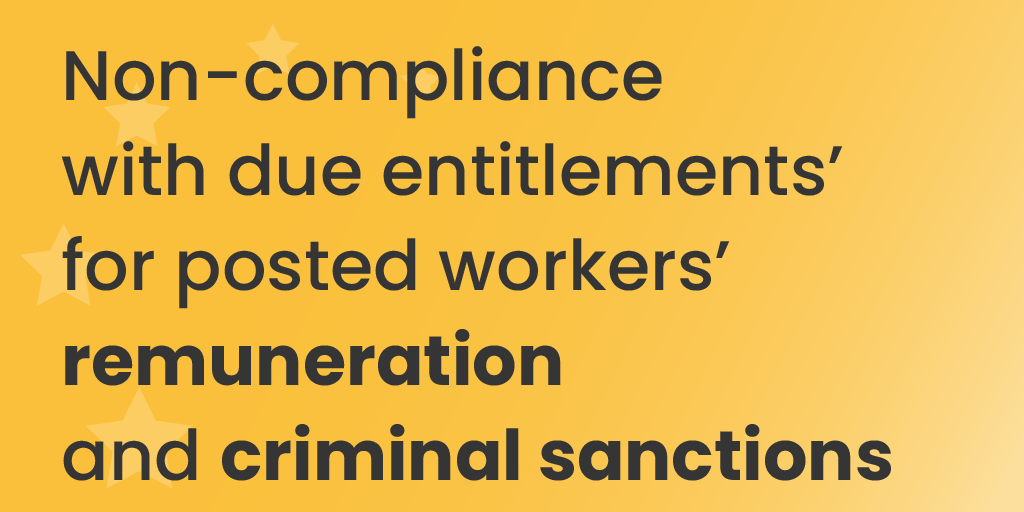
In Bouygues travaux publics (C-17/19, EU:C:2020:379) the European Court of Justice (ECJ) ruled that A1 Certificates are binding on the courts or tribunals of host Member States (MS), solely in the area of social security.
In simple words, social security subjection in a MS other than the MS in whose territory an individual is employed, does not trigger per se any conclusion as regards the “employment situation” in the latter MS (i.e., posting in the meaning of Directive 96/71/EC or employment within the territory of the host MS).
To understand the impact of the binding value of A1 Certificates on employment related breaches, the relating jurisprudence of two MS, France and Belgium can be addressed.
France
In France “registering employees with the general Social Security scheme is a legal obligation with no exceptions”, and “the registration of the insured person is the operation by which an employee is officially listed as an insured person in France. It is done online, via the pre-employment statement (déclaration préalable à l’embauche – DPAE)” (www.urssaf.fr ).
The French Cour de Cassation ruled that “ […] the DPAE is intended, at least in part, to ensure the effectiveness of controls by the competent national authorities in order to ensure compliance with employment and working conditions imposed by labour law” (Cour de Cassation, Criminal Chamber, 12 January 2021, 17-82.553, FR: CCASS:2021:CR00024, paragraph 39).
In simple words, the registration with the general social security scheme does not necessarily trigger subjection to the French social security system (provided that an A1 Certificate was issued by the competent authority of another MS).
An example relating to (unlawful) posting:
- France is not challenging the probatory value of an A1 Certificate (from the perspective of social security coordination rules), obviously without prejudice to the ECJ ruling in Altun and Others (C-359/19)
- a lawful posting (under the French labour law), must be notified by means of a declaration of posting in the meaning of Article 9.1 (a) Directive 2014/67/EU (SIPSI declaration); failure to make such a declaration, results in administrative fines
- however, provided that the French labour authority will ascertain that the posting is unlawful (from the perspective of the French labour law), a declaration of employment (DPAE) will be deemed to be retroactively due, and the breach of concealed employment will be established retroactively (breach that trigger criminal sanctions)
- no subjection to the French social security system, eventually only a presumption that the principle of lex loci laboris might be of relevance
Belgium
In Belgium Dimona (Immediate Declaration) is the name of an online service whereby employers are required to register a new employee with the National Social Security Office.
Non-compliance with the obligation to declare triggers a breach of the Royal Decree of 5 November 2002, sanctioned by the Social Criminal Code (Art 181, sanction level 4).
Situations of employment in Belgium and social security subjection in another MS (i.e., A1 Certificate issued by the competent authority of another MS, even if wrongfully issued), are not submitted to the immediate declaration of employment (DIMONA).
In such situations, the employer must send the LIMOSA online declaration (LIMOSA does not represent solely a “notification of posting” in the meaning of Art 9 Directive 2014/67). Failure to make the LIMOSA declaration, triggers a breach sanctioned by the Social Criminal Code (Article 182, sanction level 4, and where a user is involved, Article 183 sanction level 3 on behalf of the latter).
In VERBRAEKEN EN ZONEN BVBA, referring to previous case-law, AG Bart de Smet upheld that:
“In my view, that provision states sufficiently clearly that the Dimona obligations are essentially aimed at declaring the employment of an employee in Belgium, with a view to collecting social security contributions.
As cited above, on 2 February 2016 the Court held that the Dimona regulation is intended to apply the Belgian social security provisions and therefore does not apply to workers with an A1 certificate”. (Cour de Cassation, Conclusion P.21.0738.N, 26 October 2021, BE : CASS :2021:CONC.20211026.2N.5, paragraphs 19 and 21).
The case is about factual employment by a Belgian company, of drivers have concluded employment contracts with a Lithuanian letter box company, the latter in possession of a Community transport authorisation as required under Regulations 1071/2009 and 1072/2009. The drivers were covered (for a certain period) by A1 Certificates issued by the competent authority of Lithuania (see to that extent the request for a preliminary ruling from the Hof van Cassatie, C-661/21, Verbraeken J. en Zonen BV).
However, in such situations, the employer can be prosecuted for breach of Art. 4, § 1 Royal Decree No 5 of 23 October 1978 on the keeping of social documents (general and special staff register and the individual account must be kept by the employer). That breach is sanctioned by the Social Criminal Code (Article 187 individual account of payment, sanction level 3, and Article 188, general and special staff register, presence register and the working time record, sanction level 4).
As regards terms and conditions of employment, in cross-border situations, cases that are out of the scope of Directive 96/71/EC, must be addressed under Articles 8 and 9 of Regulation 593/2008 (Rome I), regardless of the social security subjection.
The takeaway
Enforcing the binding value of A1 Certificates is not a “master key”. Intellectual arrangements meant to freely determine the social security applicable legislation, and wrongfully covered by A1 Certificates, can be otherwise sanctioned.





